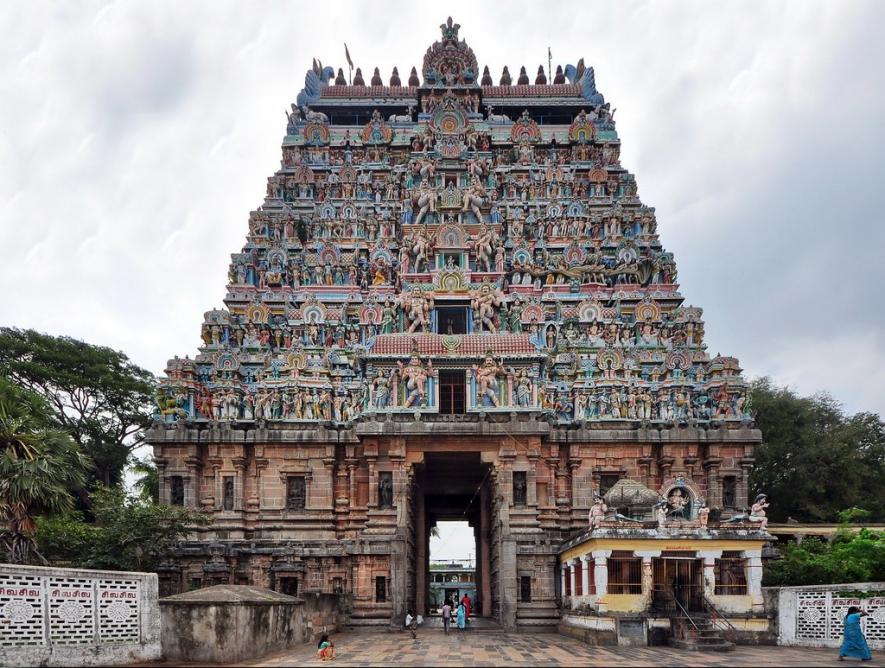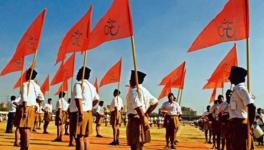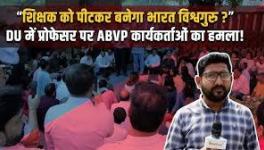TN: Chidambaram Natarajar Mismanagement Exposes Private Management of Temples

Image Courtesy: Flickr
The Natarajar temple or Sabanayagar temple in Chidambaram, built in the 10th century by the Chola dynasty, is not only the oldest in Tamil Nadu but also carries a history of conflict with the state. The temple is managed by the 'Pothu Dikshitars' or 'Dikshitars', a Tamil brahmin sub-sect unlike most of the other famous and historic temples.
The government of Tamil Nadu or the Hindu Religious and Charitable Endowments (HR&CE), which manages over 36,000 Hindu and Jain temples, have very little or no say in the day-to-day functioning of the temple.
The freedom enjoyed by the dikshitars has led to controversies in the temple administration, including mismanagement of funds and violating government orders on permitting devotees to specific 'mandapas' in the temple.
The conflict between the state government and the dikshitars has a long history, with legal battles being pursued by dikshitars against government takeover.
On June 7 and 8, a five-member team of HR&CE officials visited the temple to verify the accounts and other assets, following frequent complaints from devotees, only to be refused cooperation by the administration.
Though the right-wing continues to make hue and cry for freeing temples from government control, the Natarajar temple remains a classic case of why temples should not be let off from the control of the state.
CONFLICT CONTINUES
The history of conflict between the dikshitars and the state dates back to 1885 when the former approached the Madras High Court demanding private status. After failing in their attempt, the dikshitars demanded exemption in 1925 during the formation of the Hindu Religious Endowments Board.
The then government had accepted the request with the condition of a couple of sections of the Act being applicable relating to accounts and administrative schemes. The efforts to streamline the administration by appointing a 9-member committee of dikshitars were made in 1933, which was challenged in the high court again, only to be upheld with modifications in 1939.
A policy decision to abolish private temples was taken in 1951, which was struck down by the Madras High Court in 1959. The appeal to the Supreme Court was later withdrawn by the government.
The decision to appoint an executive officer to the temple in 1982 was again challenged in the Madras High Court and the Supreme Court. The court ruled in favour of the dikshitars in 2014, bringing an end to the long legal battle.
The previous All India Anna Dravida Munnetra Kazhagam (AIADMK) was criticised by the Dravida Munnetra Kazhagam (DMK) for not filing an appeal in the Supreme Court. But, the DMK seems to have toned down the urge to take over the temple administration, even as the right-wing groups continue to bat for freeing temples from government control.
OFFICIALS TURNED AWAY
After receiving several complaints of mismanagement by the dikshitars, the HR&CE department formed a 5-member committee to verify the financial and other temple records in 2014. The HR&CE department claimed to receive multiple complaints about maladministration by the dikshitars.
The department and the dikshitars cited sections from the Tamil Nadu HR&CE Act, 1959 to inspect and deny permission for inspections, respectively. The HR&CE claimed to have permission to inspect the temple records under sections 23 and 33 of the Act, while the dikshitars claimed section 107 provides an exemption for the temple.
A day before the scheduled inspection, the minister for HR&CE visited the temple on June 6. The visit created a stir among the dikshitars, but the minister claimed to have visited the temple only to worship the deity. He also said that the government wanted to act as a bridge between the devotees and the temple administration.
Despite the olive branch extended by the minister, the dikshitars refused to cooperate with the officials the very next day.
GOVT RETREATS ON TAKEOVER?
The DMK government had warned of exploring the possibilities of taking over the temple barely a couple of months ago but seemed to have toned down its vigour in doing so. The DMK, in 2014, following the Supreme Court judgement on handing over the temple to the dikshitars, criticised the AIADMK regime for failing to file an appeal.
But, the dikshitars have been making news for all wrong reasons in the recent past. From hitting a woman from the scheduled caste community for attempting to enter the ‘Kanagasabai Medai," a platform in front of the principal deity. Twenty dikshitars were booked under 'The Scheduled Castes and the Scheduled Tribes (Prevention of Atrocities) Act.
One dikshitar was barred from performing duties in the temple following his role in organising a wedding in the famous 1000-pillar mandapam, the first of its kind in the history of the temple.
RIGHTWING’S CALL A FARCE
The right-wing groups, led by the Rashtriya Swayamsevak Sangh (RSS), have been advocating 'free temples' from government control. Self-made godmen, including controversial yoga guru Jaggi Vasudev, have been leading such campaigns.
In a book titled 'Yaar Kaiyil Indhu Aalayangal' (Who Controls Hindu Temples) S G Ramesh Babu exposes the false claims of the Hindu temples being free from government control. "The temples were never controlled by private people. If we question the right-wing group on who should govern the temples, they don't have the answers," he writes in the book.
The mutts in Tamil Nadu have a history of being mismanaged by the 'Seers', leading to the intervention from several governments. "Madurai Mutt is one of the badly managed mutts creating a lot of controversies. But the right-wing groups demand Madurai Meenakshi temple be under the control of Madurai Aadheenam. It could only be a disaster," he said.
The famed temples in Tamil Nadu could face the fate of the Natarajar temple if they were handed over to private people to run the affairs.
“The Natarajar temple receives a lot of income during different festivals. The dikshitars have been accused of appropriating funds donated by the devotees. The income of temples has a history of improving after being taken over by the HR&CE, which is understandable,” says Ramesh Babu.
The properties of temples and mutts amount to lakhs of acres of farm and housing lands, buildings, and gold and silver chariots. "If there is no structure like HR&CE, these properties and panchaloha idols would have vanished. The discrepancies in the functioning of this department should be corrected, but the calls for dismantling such a structure would be disastrous," Ramesh Babu said.
The agenda of the right-wing has been to accumulate votes through temples, which has gained little success in Tamil Nadu. The RSS, through its different organisations, have been trying to make inroads into the temples, but several political and civil society organisations have opposed the demand.
Get the latest reports & analysis with people's perspective on Protests, movements & deep analytical videos, discussions of the current affairs in your Telegram app. Subscribe to NewsClick's Telegram channel & get Real-Time updates on stories, as they get published on our website.























